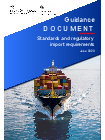UK standards and regulatory import requirements
This guidance provides an introductory guide to the standards and regulatory requirements that businesses may need to meet, to import and sell goods in the UK.
1. Standards that apply to goods imported into the UK
Goods imported into the UK must comply with 3 types of standards. These standards apply to plant seeds, food, and manufactured goods:
- product marking standards
- labelling standards
- marketing standards
Product marking standards
Before you can sell a product that you have imported to the UK, you must comply with the relevant marking standards. The UK’s CE marking standards will apply until the end of 2024. After that, you must comply with the UK Conformity Assessment (UKCA) marking, the new UK product marking guide.
For more information about product marking standards, you can read the guidance on placing manufactured goods on the market in Great Britain.
Labelling standards
There are 5 labelling standards that you must comply with to import and sell products in the UK:
1. Food labelling: giving food information to consumers
Manufacturers must comply with standards on how to give customers information on food products in order to be placed on the market in the UK.
2. Food standards: labelling and composition
Comply with these legal standards and composition requirements for food products like bottled water, milk, and meat.
3. Food labelling and packaging
Comply with the general requirements for labelling and packaging products for sale in the UK.
4. Organic food: labelling rules
Comply with the standards and requirements for labelling products as organic or using organic production terms if you produce, prepare, store, import or sell organic products.
Manufacturers and retailers of textiles must follow special labelling rules.
The product’s label must show the fibre content, including fur and other animal parts. If a product consists of 2 or more components with different contents, the label must show all content.
Find out more about the textile labelling requirements on the Business Companion website.
Marketing standards
Marketing standards apply to specific products like wine, poultry meat, hatching eggs and chicks, beef and veal. You should read the Guidance on marketing standards for more information.
2. Import requirements for products
Certain products are subject to special rules requiring businesses to acquire licences and certificates before being imported into the UK. In law it is a requirement that a country seeks approval for market access to export high-risk sanitary and phytosanitary (SPS) commodities. Unless the country has been approved for these products it will not be possible for a business to export them to Great Britain.
Products requiring licences and certifications, include:
- animals and animal products
- plants and plant products
- high-risk food
- veterinary medicines
- human medicine
- controlled drugs
- waste
- products containing F Gas
- precursor chemicals
- hazardous chemicals
- nuclear materials
- guns, knives, swords and other weapons
- weapons and goods that could be used for torture or capital punishment
3. Import controls for products and countries
Import controls are restrictions on high-risk products to ensure any risks to human health and animal health have been mitigated. Import controls ensure sustainable production and that consumers and UK businesses are buying products that are what they claim to be.
Currently, there are import controls on:
- organic products
- plants and seeds
- illegal, unreported and unregulated fishing
- veterinary products
- some sanitary and phytosanitary products: see foodstuffs with GB import restrictions
There are also import restrictions on goods from North Korea and Ukraine. Emergency import control measures may be introduced when responding to a specific incident which affects standards.
You should check all applicable import controls in the UK to ensure you can import and sell your product in the UK.
This guidance is also available as a PDF:
